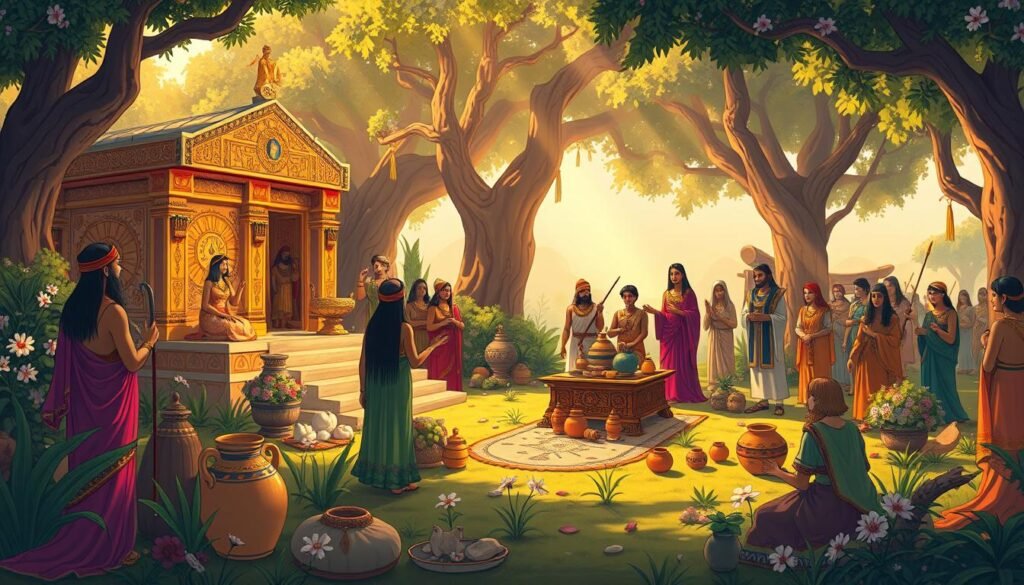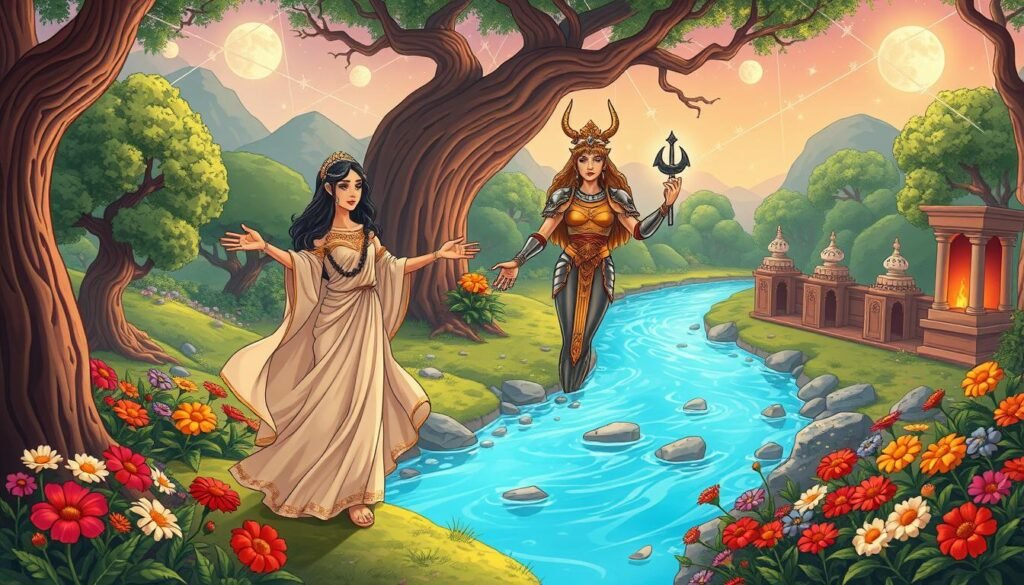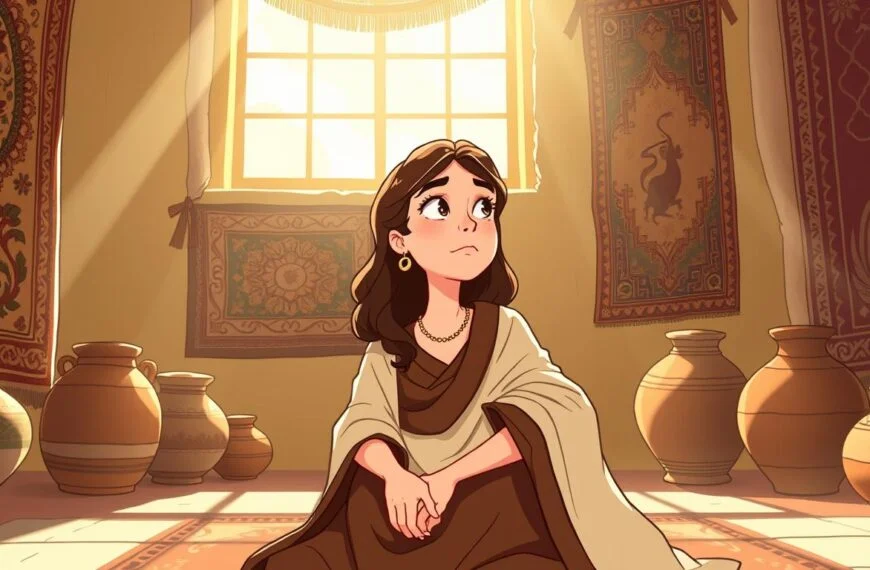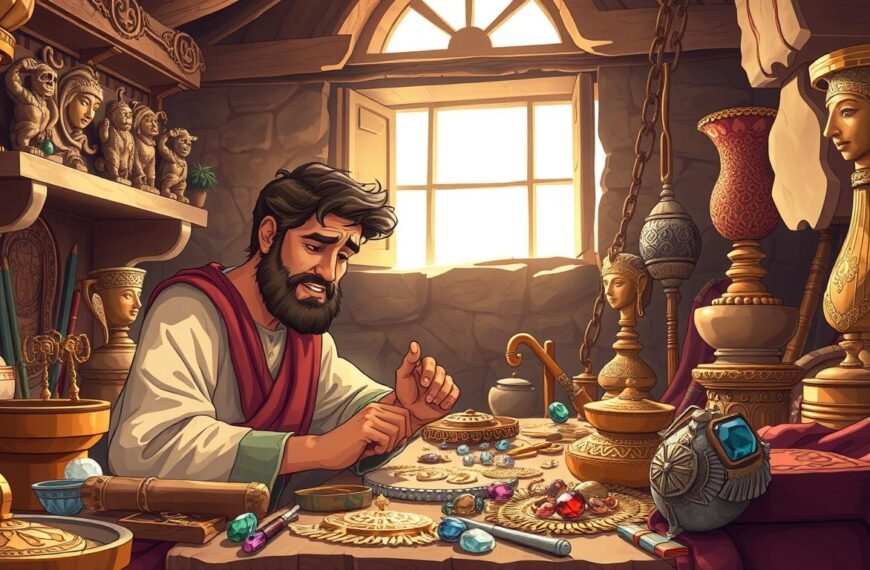Ever thought about how one goddess could influence so many? Ashtoreth, the top goddess of Canaan, did just that. She led kings wrong and shaped cultures far and wide.
Ashtoreth was the goddess of the Sidonians, as the Bible tells us. Her worship shows a big fight between believing in one God and following old ways. She was seen as a goddess of love and war.
Her many forms, like a moon-goddess or a cow-horned figure, show how deep her worship was. Many were drawn to her, despite warnings against idolatry. This made ancient beliefs very complex.
Understanding Ashtoreth’s Name and Origin
The name Ashtoreth likely comes from Astarte. She was a key goddess in Canaanite mythology. She was known for fertility, war, and the moon.
Ashtoreth’s name is found in the Bible, in Judges 2:13 and 3:7. This shows her big role in ancient religions.
Ashtoreth is linked to Asherah. They were seen as the same in Babylonian beliefs. Different places had their own ways of worshiping Ashtoreth, like Canaan, Egypt, and more.
In 1 Kings 11, Ashtoreth is tied to Sidon. This shows she was loved by many.
Worshiping Ashtoreth included special rituals. People made offerings and raised Asherah poles. These acts were different from following one God, causing problems in the Bible.
Ashtoreth is a complex figure in Canaanite myths. She represents many parts of life and conflict.
The Attributes of Ashtoreth as a Deity
Ashtoreth was a goddess of love and war. She was very important in ancient times. Her power was both good and bad, showing the strength of women.
As the moon goddess, Ashtoreth stood for life’s cycles. Her followers did rituals tied to the moon. These rituals helped with fertility and winning battles.
She was also about love, with rituals full of passion and love. This was different from Asherah, who focused more on fertility. Ashtoreth’s unique qualities made her stand out in Canaanite beliefs.
Ashtoreth was linked to idols that showed her divine side. These symbols spread her influence far and wide. The name Ashtaroth shows how she was seen in many ways.
Ashtoreth was a complex figure. Her many sides captured the hearts of those who worshipped her.
Who Is Ashtoreth In The Bible?
Ashtoreth in the Bible shows the problem of idolatry for the Israelites. She was seen as the top goddess of Canaan and linked with false gods. Her worship was a big change for Israel’s faith, especially under King Solomon.
The Old Testament talks a lot about Ashtoreth and Israel’s fight against other gods. Judges and 1 and 2 Samuel tell of the people’s struggles and faith lapses. King Solomon building a temple for Ashtoreth shows his move away from Yahweh and a shift in Israel’s culture.
Worshiping Ashtoreth meant doing things against the Ten Commandments. It included acts of sexual sin and sacrifices, unlike what God wanted. The story of Ashtoreth warns us about the risks of ignoring God’s rules for the lure of false gods.
The Cultural Context of Ashtoreth’s Worship
Ashtoreth’s worship was important in ancient times. It showed how people believed in their gods. They thought Ashtoreth brought fertility and prosperity.
They did things like ritual prostitution to please her. This was seen as wrong back then. But they believed it helped their crops and communities grow.
In the Book of Jeremiah, we see how much people loved these rituals. They kept coming together to honor the Queen of Heaven. Even when told not to, they kept worshiping.
This shows how strong their beliefs were. They didn’t want to give up their traditions.

King Josiah tried to stop Ashtoreth’s worship. He destroyed places where people prayed to her. This shows there was a fight between those who followed Yahweh and those who followed other gods.
Ashtoreth was also linked to war and fertility. This made it hard for the Israelites to resist idolatry. Her story in the Bible tells us about the battle between cultural traditions and faith.
Frequency of Ashtoreth in Biblical Texts
Ashtoreth is mentioned often in the Bible. This shows her big role in ancient worship. In Judges, the Israelites left God to follow Ashtoreth and Baal. This shows how deep idolatry was in ancient Israel.
She is also found in 1 Samuel and 1 and 2 Kings. The mention of “the Baals and Ashtoreths” shows she was linked with false gods. This shows how common these practices were and Israel’s ongoing battle with idolatry.
Ashtoreth’s mentions in the Bible show a constant fight between Yahweh worship and the customs of other nations. God’s dislike for idolatry is clear through prophetic messages. This highlights the cultural struggle the Israelites faced.
The many Ashtoreth mentions remind us of these old battles. They show the hard work of keeping to one God in a world full of idols. These stories still touch on themes of loyalty and temptation, showing the ups and downs of faith.
To learn more about these themes, check out this interesting article on biblical figures and their cultural importance.
Ashtoreth’s Connection to the Goddess Asherah
Ashtoreth and Asherah are closely linked in the Canaanite religion. They both relate to fertility and caring for the earth. Asherah is a key goddess, along with Baal and Astarte, in ancient Canaanite worship.
The relationship with Ashtoreth shows two sides of female divinity. Asherah is the caring one, while Ashtoreth is about love and war. They were often worshipped together, showing the mix of Canaanite beliefs.
Asherah is mentioned in the Old Testament thirty-nine times. This shows her big role in Canaanite stories. Her worship, especially under Manasseh, shaped society and Israel’s kingdoms. Asherah and Ashtoreth’s worship shows the complex nature of Canaanite religion.
Looking closer at their connection, we see how Asherah’s worship influenced Ashtoreth’s. Their rituals often mixed, with offerings to Baal and these goddesses. This shows people’s deep desire for fertility and favor.

Asherah’s lasting worship in Canaanite religion shows her deep impact. Her and Ashtoreth’s connection highlights a lively part of ancient beliefs.
To learn more about these goddesses, check out this article. It goes into their roles in ancient stories and cultures.
The Relationship Between Ashtoreth and Baal
In Canaanite beliefs, Ashtoreth and Baal were seen as a pair. Baal was the sun god, and Ashtoreth was the moon and fertility goddess. They were key to nature and human life.
Their worship was tied to farming and the seasons. This was important for the Canaanite people.
Baal worship was big in ancient Israel. It included rituals like child sacrifice. This was a dark part of their faith.
Ashtoreth was linked to sex and fertility. Her worship was full of sexual rituals. These rituals were old, long before Hebrew worship.
Their connection showed a deep cultural tradition. It was about keeping the gods happy for good harvests. For Israelites, following Baal and Ashtoreth was a way to fit in.
This led to idol worship, causing big problems. They lost the Promised Land because of it.
These old faiths were a test for the Hebrew God. Baal and Ashtoreth’s pull was a constant challenge. It showed the struggle between true faith and idol worship.
Knowing about this helps us understand ancient faiths. It also shows the ongoing spiritual battles today. For more, check out Baal and Asherah worship.
Geographical Spread of Ashtoreth Worship
Ashtoreth worship spread far beyond Canaan. It reached many ancient civilizations. In Phoenicia, especially in Sidon, her worship thrived.
Sidon was a key place for her rituals. It was also a major center for trade. This helped spread her worship to more places.
In Egypt and among the Philistines, Ashtoreth’s worship mixed with others. This shows how cultures exchanged ideas. It shows how different societies worked together.
But, the Israelites often struggled with idolatry. They sometimes turned to Ashtoreth. This shows how hard it was to resist the influence of other cultures.
Ashtoreth’s worship was a big deal in ancient times. It shows how faith and power worked back then. It shows how far her influence went.
FAQ
Who was Ashtoreth in the Bible?
Ashtoreth was a goddess from ancient Canaan. She was called “the goddess of the Sidonians” (1 Kings 11:33). Her worship led to King Solomon’s downfall.
What is the origin of the name Ashtoreth?
The name Ashtoreth comes from Astarte. Astarte was the main female deity in Canaanite mythology. Both names show the importance of female gods in ancient times.
What are the key attributes associated with Ashtoreth?
Ashtoreth was a goddess of love and war. She was linked to the moon, showing her feminine side. Her worship included passionate rituals and military symbols.
How does Ashtoreth feature in biblical scripture?
The Bible talks about Ashtoreth to show Israel’s rebellion against God. This is seen in idolatry and the influence of pagan practices. King Solomon even built a temple for her in Jerusalem (1 Kings 11:5).
What was the cultural significance of Ashtoreth’s worship?
Ashtoreth’s worship was part of a rich cultural scene. It included sexual acts and sacrifices. These practices showed the struggle between following Yahweh and the allure of pagan customs.
How often is Ashtoreth mentioned in biblical references?
Ashtoreth is mentioned many times in the Bible. This is especially true in Judges and 1 and 2 Kings. It shows her big influence and the challenges of monotheism.
What is the relationship between Ashtoreth and Asherah?
Asherah and Ashtoreth were related in Canaanite religion. Asherah was linked to fertility, while Ashtoreth was associated with love and war. They were often worshipped together at the same sites.
How is Ashtoreth connected to Baal in Canaanite beliefs?
In Canaanite myths, Ashtoreth was Baal’s partner. Baal was seen as the sun, and Ashtoreth as the moon and fertility. Together, they represented the natural and spiritual worlds.
In which regions was the worship of Ashtoreth prevalent?
Ashtoreth’s worship spread far, to Phoenicia, Egypt, and Philistia. This shows how her cult was widespread and how ancient cultures exchanged ideas.

Rockin’ the faith, one verse at a time!
Growing up, the Bible’s stories deeply impacted me. Now, with over 15 years of preaching experience, I blend timeless teachings with modern technology, making them relevant for today’s world.
Bible Hub Verse is my platform to share historical insights and thought-provoking articles, exploring both familiar and uncommon Christian topics. My passion is building a welcoming online space for everyone to learn, grow in their faith, and discover the Bible’s enduring message.
Join the journey!
God bless you.









